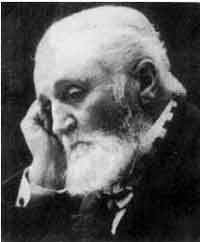|

John Creaghe
(1841-1920)
(Ephéméride anarchiste, http://ytak.club.fr/fevrier3.html)
|
Creaghe, John
[Juan] (1841-1920),
physician and anarchist, was born in 1841 in
Limerick. After qualifying as a physician in 1865 at the Royal
College of Surgeons in Dublin, he took up his practice at
Mitchelstown, Co. Cork the following year. He was fully licensed
as a medical practitioner in 1869 from the King's and Queen's
Colleges of Physicians in Ireland. Creaghe remained in practice
in Mitchelstown until 1874, when he emigrated to Buenos Aires,
Argentina, and quickly became a follower of anarchism. It is
likely that he became an anarchist at least in part under the
influence of Errico Malatesta (1853-1932), the seminal anarchist
thinker and activist. By 1890, Creaghe had relocated to
Sheffield, where he worked in a poor, working-class district of
the English city, populated by a great many Irish immigrants,
having arrived there from Dublin the previous year. He soon
involved himself with the local branch of the famous designer
William Morris' Socialist League, but they broke away early in
1891 to form a specifically anarchist group in Sheffield. The
Sheffield Anarchist newspaper was founded by Creaghe and
Fred Charles.
In 1892 Creaghe left Sheffield and traveled
to Liverpool, London, Spain and finally, Argentina. Once
there, he began another publishing venture with El
Oprimido (1893-97), which became La Protesta Humana
(1897-1903), and the hugely influential La Protesta
(1903 to present day). In each case, Creaghe invested
considerable time, energy and money into these propagandist
ventures which would eventually bear fruit in the form of
the Regional Workers Federation of Argentina (FORA), the
mighty anarcho-syndicalist union which won the hearts and
loyalties of 20,000 Argentine labourers by the time of the
events of the "Tragic Week" of 1919. Creaghe was also
heavily involved in the Free School movement in Buenos
Aires, and was director of the Rationalist School in Luján,
an anarchist educational experiment along the lines of those
founded by the Spanish anarchist Francisco Ferrer
(1859-1909). Creaghe also rallied to the defense of a young
Polish immigrant who killed the chief of police in Buenos
Aires at an anarchist demonstration in 1909. At the same
time, he worked as a doctor from his base in Luján, Buenos
Aires province, combining easily the roles of local
physician and anarchist militant.
Creaghe took on his travels again in 1911,
settling eventually in Los Angeles among Mexican anarchists.
He took part in producing yet another influential anarchist
newspaper, La Regeneración, and struck up a good
friendship with the leading Mexican anarchist, Ricardo
Flores Magón (1874-1922), who died in Leavenworth Federal
Penitentiary in Kansas. He, along with Creaghe, was involved
in the Baja California revolt of 1910 as well as giving
support to the fragmented anarchist movement in Mexico in
the years after the start of the Mexican revolution of
1910-1914.
John Creaghe's name is most often
associated with anarchism in England and Argentina, though
he was also active in the United States in support of
exiled Mexican anarchists. Dr. Creaghe helped pioneer a
movement of critical importance to Argentine and South
American labour history. John Creaghe died on 19 February
1920 in Washington D.C. while in prison.
Edmundo Murray
References
- Ó Catháin, Máirtín,
Dr. John O'Dwyer Creaghe: Irish-Argentine Anarchist
(1841-1920). "Irish Migration Studies in Latin
America" (www.irlandeses.org), cited 11 December 2004.
- O'Tool, Alan, With The
Poor People Of The Earth: A Biography Of Doctor John Creaghe of
Sheffield & Buenos Aires (London: Kate Sharpley Library,
2005).
- Pasini, Francisco José. Anecdotario Lujanero.
Luján: Librería de Mayo, 1977.
|


